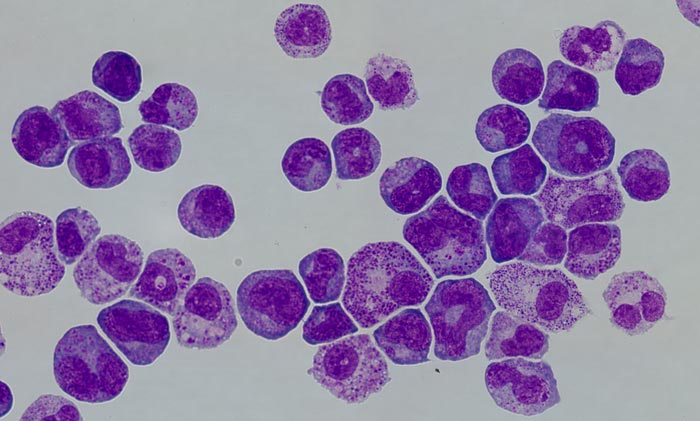Researchers identify therapeutic target for aggressive blood cancer

Hematopoietic stem cells and pro-leukemic cells pictured together in cell culture
Credit: Saverio Minucci/Instituto de Oncologia de Milan
Untangling genomic architecture of acute promyelocytic leukaemia reveals gene that can suppress tumour.
A new study published today in the journal Genes & Development reveals a gene that normally suppresses the formation of tumours but is reprogrammed at the onset of acute promyelocytic leukaemia (APL), an aggressive type of blood cancer that is responsible for 5-15% of all types of leukaemia.
The findings pave the way for the development of drugs that boost the expression of the gene at the earliest stages of cancer formation, intercepting the disease before it becomes uncontrollable.
APL occurs because of chromosomal translocations, in which a chromosome breaks and a portion of it reattaches to a different chromosome. In APL, this results in a gene fusion event between the promyelocytic leukemia (PML) and retinoic acid receptor alpha (RARα) genes. Previously healthy stem cells begin to express a new protein – PML/RARα – which blocks their differentiation. Eventually, the bone marrow fills up with abnormal white blood cells known as promyelocytes that lead to a shortage of other types of blood cells and prevent normal blood production.
Treatments for APL include drugs such as all-trans-retinoic acid (ATRA), which result in 90% of cases entering remission. However, new avenues of therapy are still required for patients that do not respond to this treatment, as well as for the large proportion of patients that relapse after few years.
Despite the importance of chromosomal translocations in initiating the disease, little is known about how PML-RARα changes the genomic architecture of cells. Researchers at the Centre for Genomic Regulation (CRG) and the Centro Nacional de Análisis Genómico (CNAG-CRG) in Barcelona, and the European Institute of Oncology in Milan, used mouse models that closely mimic the progression of APL in humans to study changes in cells during the onset and progression of the disease.
They found that PML-RARα initiates a series of alterations that result in changes to the structural support of chromosomes and the repression of transcription, as well as changes in chromosomal compartments that ‘open’ or ‘close’ access to particular regions of the genome.
One of the genes most affected by these changes at an early stage was KLF4, which codes for a protein that binds to DNA to control the rate of transcription of genetic information, also known as a transcription factor. KLF4 activity was inactivated during the progression of APL. The researchers found that, when cells were manipulated to overexpress KLF4, it suppressed the self-renewal traits of cancerous cells and reversed the effects caused by the actions of PML-RARα.
“Overexpression of KLF4 acts as a tumour suppressor in acute promyelocytic leukaemia. Our finding opens a new avenue of treatment to target this aggressive disease alongside existing treatments. In follow up studies, we have observed that combination of ATRA with KLF4 overexpression can suppress the cancerous traits mediated by PML-RARa, suggesting a potential therapy for non-responsive or relapsed patients that could be spun off from this work”, says Glòria Mas Martin, first author of the study and previously a postdoctoral researcher at the CRG.
The method, developed in Luciano Di Croce’s laboratory at the CRG, can also be used to study changes to the genomic architecture of other types of cancer, which according to the authors, could reveal other possible therapeutic targets yet to be discovered. “The steps that initiate cancer are the most interesting because they are the equivalent of the snowball that turns into an avalanche. This approach could be used to understand the very first effects of other oncogenic proteins that act as transcriptional repressor, leading to the development of new therapies that target a mechanism before it spirals out of control,” says ICREA Research Professor Luciano Di Croce, senior author of the study and researcher at the CRG.
Journal: Genes & Development
DOI: 10.1101/gad.349115.121
Method of Research: Experimental study
Subject of Research: Animals
Article Title: In vivo temporal resolution of acute promyelocytic leukemia progression reveals a role of Klf4 in suppressing early leukemic transformation
Article Publication Date: 20-Apr-2022
Media Contact
Omar Jamshed
Center for Genomic Regulation
omar.jamshed@crg.eu
Office: 34-933-160-237
All latest news from the category: Health and Medicine
This subject area encompasses research and studies in the field of human medicine.
Among the wide-ranging list of topics covered here are anesthesiology, anatomy, surgery, human genetics, hygiene and environmental medicine, internal medicine, neurology, pharmacology, physiology, urology and dental medicine.
Newest articles

Innovative 3D printed scaffolds offer new hope for bone healing
Researchers at the Institute for Bioengineering of Catalonia have developed novel 3D printed PLA-CaP scaffolds that promote blood vessel formation, ensuring better healing and regeneration of bone tissue. Bone is…

The surprising role of gut infection in Alzheimer’s disease
ASU- and Banner Alzheimer’s Institute-led study implicates link between a common virus and the disease, which travels from the gut to the brain and may be a target for antiviral…

Molecular gardening: New enzymes discovered for protein modification pruning
How deubiquitinases USP53 and USP54 cleave long polyubiquitin chains and how the former is linked to liver disease in children. Deubiquitinases (DUBs) are enzymes used by cells to trim protein…



